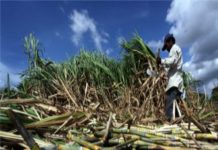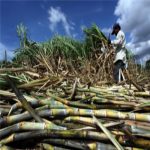BRAZILIAN REAL APPRECIATION NEUTRALIZES GAINS IN NEW YORK
Last week, the sugar futures market in New York closed out with March/2024 traded at 27.08 cents per pound, registering an increase of 34 points against the previous week’s close, equivalent to a gain of 7.50 dollars per ton. However, it is worth pointing out that the appreciation of the real against the dollar (closing out the week at R$5.0832) just about neutralized the increase of sugar prices in New York.
The remarkable crushing volume released by UNICA until October 1st is outstanding, totaling 493 million tons of sugarcane, which represents an increase of 14.24% compared to the same period the previous year. Besides, the total sugar production reached 32.6 million tons, an increase of almost 25% against the previous year. If this production pace is maintained, we might reach a total sugarcane production higher than 630 million tons at the end of the crop. However, the crushing capacity of all this volume is an issue we should look at.
In the recent COT (Commitment of Trades) released on Friday by the CFTC (Commodity Futures Trading Commission), modest increases of the purchases made by the speculative funds were seen. According to Tuesday’s data, these funds added more 10,626 lots to their positions, totaling now 175,590 lots in purchases.
It is important to note that the fluctuation on the market, considering the period from Tuesday to Tuesday, according to what was gathered by the report, was 138 points. That shows that the speculative funds were able to boost the quotations in New York apparently with a relatively low trading volume.
It is also important to say that the week was cut short due to the holiday in Brazil. Therefore, we can only look forward to what next week has in store for us.
Supposing India goes ahead with its threat not to export sugar this 2023/2024 crop, according to the numbers published by the USDA (Agricultural Department of the United States), this would result in a carry-out estimated at 11.8 million tons of sugar. This value would represent a significant increase of 24% against the carry-out seen at the 2021/2022 crop, when the country dumped almost 12 million tons of sugar onto the foreign market, despite the promise to limit the export to 7.2 million tons. Yeah, right.
It is essential to point out that such a large inventory is equivalent to about 20 weeks of domestic consumption in India, which can put pressure on sugar domestic prices. However, it is necessary to consider that part of this sugar will probably be destined for ethanol production.
As for Thailand, despite the reduction predicted in sugar production due to an accumulated water deficit of 32% over the year, the country is starting the crop with a substantial carry-in of almost 8 million tons of sugar. It is expected that it will end the crop (in November/2024) with at least 3.9 million tons as carry-out. This significant amount of available sugar can impact the foreign market, influencing prices and global supply.
Considering the supply capacity of India and Thailand, which together can contribute to at least 8 million tons of sugar (6.5 million from India and an additional 1.5 million from Thailand) and considering the extraordinary volume of sugar that Brazil is projecting for the current and the next crops, keeping an optimistic discourse on the market becomes challenging. We believe, however, that prices can still be supported until the end of the year, but it is important to note that the more artificially the market rises, the faster the drop can be.
Impartially analyzing the numbers, the sugar supply does not seem to be at an imminent risk, even considering some setbacks on the part of other great producers. What is creating concerns right now is the port logistic situation, which is causing delays in loading, problems with ship nominations and warehouse congestion. These issues, when combined, are pressuring the mills that do not have physical space to storage sugar and can choose to drive more sugar for ethanol production.
At the current price levels, each 1% of reduction in sugar production in favor of ethanol represents a significant decrease in the margin of the mills, estimated at R$3.9 million for each million of tons of sugarcane. Undoubtedly, this is a difficult decision the mills must make.
The conflict in progress in the Middle East, triggered by the terrorist attack on Israel, raises a legitimate concern: the oil price might not have fully reflected the risks associated with this volatile situation yet. Possible repercussions resulting from the instability in the region have the potential to take the market by surprise and substantially reverse the perspectives. This scenario can be equipped with a “black swan,” an unpredictable event and of great magnitude that can have a significant impact on the markets over this last quarter of the year. Let us protect ourselves.
Our contemporary compulsion for constant information updating seriously jeopardize our long-term planning capacity and strategic view. Though the incessant consumption of news can trick us into thinking we are well-informed, it often distracts us from the essential, overwhelming us with fragmented information and, paradoxically, contributing to a distorted or incomplete view of the events. In other words, too much information can, in fact, be a vector of misinformation. I did not say that. Nassim Taleb did.
The Brazilian left-wing attitude accusing Israel, victim of Hamas terrorist attacks, is despicable. It is amazing how this political group in power, which holds a series of questionable ideologies in the Brazilian politics, creates narratives that seem to belong to a parallel world, where Hamas is portrayed as a harmless group, and dictatorships such as Cuba and Nicaragua are distorted into “democracies.”
This distortion of reality is just an attempt to justify the unjustifiable and it is an example of the extremism which has mined the constructive political dialogue. Instead of approaching the problems responsibly and based on facts, the Brazilian left-wing chooses to create a distorted scenario which does not do justice to the complexity of the issues at stake.
To read the previous episodes of World Sugar Market – Weekly Comment, click here
To get in touch with Mr. Arnaldo, write on arnaldo@archerconsulting.com.br












